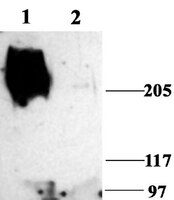AB5210-50UL Sigma-AldrichAnti-Sodium Channel Antibody, Voltage Gated, Pan (SP19 Segment)
This Sodium Channel antibody is validated for use in IHC & WB for the detection of the Sodium Channel protein.
More>> This Sodium Channel antibody is validated for use in IHC & WB for the detection of the Sodium Channel protein. Less<<Productos recomendados
Descripción
| Replacement Information |
|---|
Tabla espec. clave
| Species Reactivity | Key Applications | Host | Format | Antibody Type |
|---|---|---|---|---|
| M, R | IHC, WB | Rb | Affinity Purified | Polyclonal Antibody |
| Description | |
|---|---|
| Catalogue Number | AB5210-50UL |
| Brand Family | Chemicon® |
| Trade Name |
|
| Description | Anti-Sodium Channel Antibody, Voltage Gated, Pan (SP19 Segment) |
| References |
|---|
| Product Information | |
|---|---|
| Format | Affinity Purified |
| Control |
|
| Presentation | Affinity purified immunoglobulin. Lyophilized from phosphate buffered saline, pH 7.4, containing 1% BSA and 0.05% sodium azide as a preservative. Reconstitute with 50 μL of sterile deionized water. Centrifuge antibody preparation before use (10,000 xg for 5 min). |
| Quality Segment | MQ100 |
| Physicochemical Information |
|---|
| Dimensions |
|---|
| Materials Information |
|---|
| Toxicological Information |
|---|
| Safety Information according to GHS |
|---|
| Safety Information |
|---|
| Packaging Information | |
|---|---|
| Material Size | 50 µL |
| Transport Information |
|---|
| Supplemental Information |
|---|
| Specifications |
|---|
| Global Trade ITEM Number | |
|---|---|
| Número de referencia | GTIN |
| AB5210-50UL | 04053252742187 |
Documentation
Licencias necesarias
| Título |
|---|
| PRODUCTO REGULADO POR LA SECRETARÍA DE SALUD |
Anti-Sodium Channel Antibody, Voltage Gated, Pan (SP19 Segment) Ficha datos de seguridad (MSDS)
| Título |
|---|
Anti-Sodium Channel Antibody, Voltage Gated, Pan (SP19 Segment) Certificados de análisis
Ficha técnica
| Cargo |
|---|
| RABBIT ANTI-PAN VOLTAGE GATED SODIUM CHANNEL, SP19 AFFINITY PURIFIED POLYCLONAL ANTIBODY |







